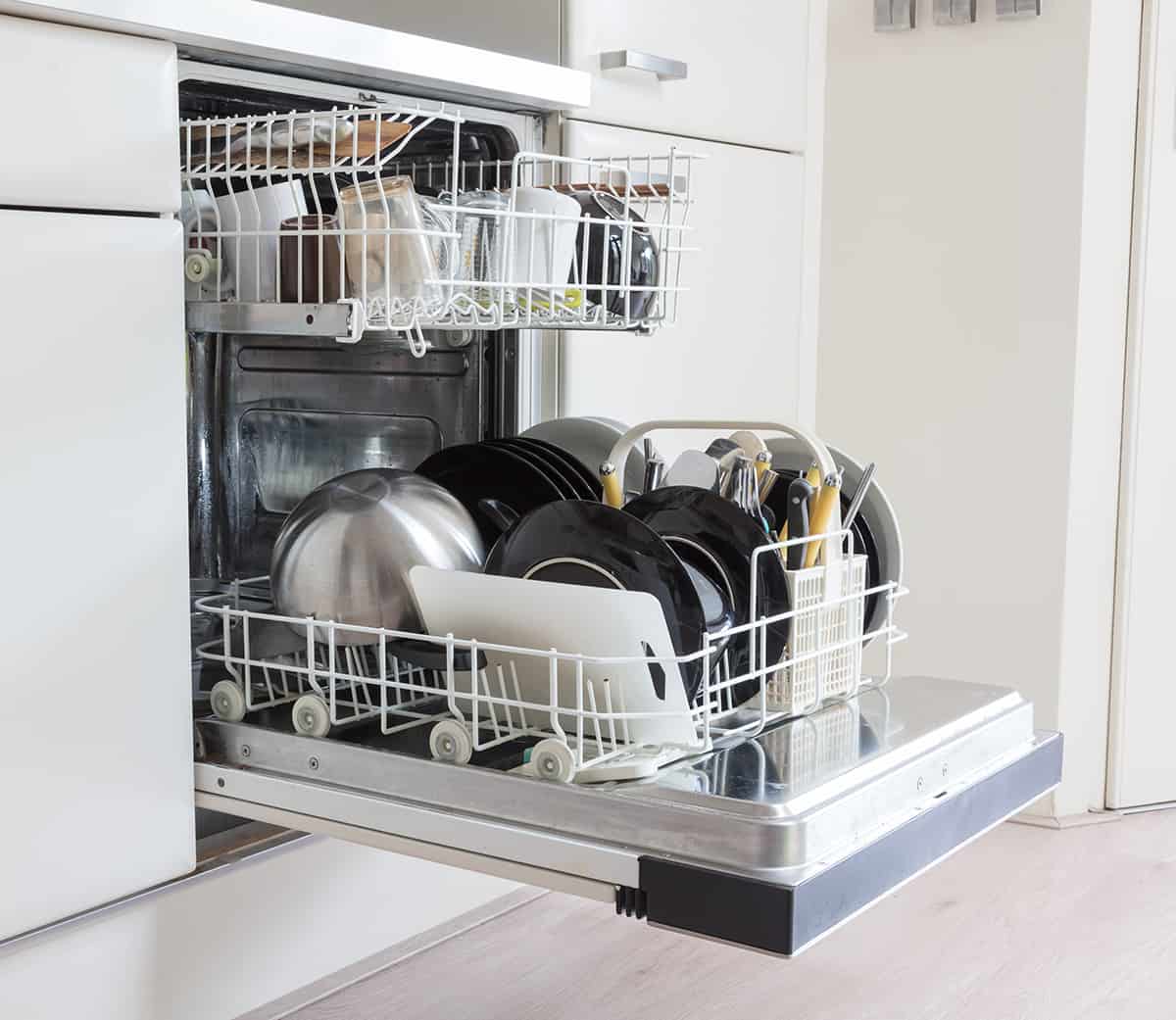Dishwashers and hand washing are two common ways to clean our dishes. Some people prefer the convenience of a dishwasher, while others like the control they have with hand washing. This age-old debate has many people wondering which method is better for their home, the environment, and their health.
Using a dishwasher is often better than washing by hand. Dishwashers save time and effort, and they usually use less water and energy. They also clean dishes more effectively, killing more germs. However, hand washing is better for delicate items. So, using a dishwasher is generally better, but hand washing is still useful for certain dishes.
In this guide, we will explore the pros and cons of dishwashers and hand washing. We’ll compare their environmental impact, cost, hygiene, and convenience.
An Intro to Dishwashers

Dishwashers are machines that make washing dishes easier and more efficient. In this section, we’ll learn about the types of dishwashers and how they work, as well as their energy and water efficiency.
Types of Dishwashers
There are three main types of dishwashers: built-in, freestanding, and countertop. Built-in dishwashers are installed in your kitchen and are the most common type. Freestanding dishwashers can be moved around, and you can connect them to your sink when needed. Countertop dishwashers are smaller and can be placed on a counter or table, making them great for small kitchens or apartments.
How Dishwashers Work
A dishwasher cleans dishes by spraying hot water and detergent on them. It has several parts, like racks for holding the dishes, a spray arm to spread water, and a heating element to dry the dishes. The cleaning cycle starts with rinsing off the food, then washing with soap and hot water, and finally, drying the dishes.
An Intro to Hand Washing

Hand washing is the traditional method of cleaning dishes with soap, water, and some elbow grease. Here, we’ll discuss hand-washing techniques and the types of dishwashing detergents available.
Hand Washing Techniques
There are three main steps to hand washing dishes: soaking, scrubbing, and rinsing.
First, soak the dishes in warm, soapy water to help loosen stuck-on food. Next, scrub the dishes using a sponge or scrub brush to remove any remaining food and stains. Finally, rinse the dishes with clean water to remove soap and debris.
Dishwashing Detergents
Dishwashing detergents come in different forms, such as liquid, powder, or tablets. Liquid dish soap is the most common type and is easy to use.
Dishwasher vs. Hand Washing:
After understanding the basics of both dishwashing techniques, let’s see how they compare.
Environmental Impact
When choosing between a dishwasher and hand washing, it’s important to consider their impact on the environment. This includes water and energy consumption, as well as carbon footprint.
Water Consumption
Dishwashers usually use less water than hand washing. The amount of water used in hand washing can vary depending on how it’s done, but a dishwasher often uses a controlled amount of water per cycle.
Energy Consumption
Dishwashers also tend to use less energy than hand washing, especially if they are Energy Star certified. Hand washing often requires heating water, which can consume more energy than using a dishwasher.
Carbon Footprint
The carbon footprint of dishwashing depends on factors like the energy source used and the efficiency of the appliance. Dishwashers generally have a lower carbon footprint than hand washing, but choosing an energy-efficient dishwasher and using eco-friendly detergents can reduce it even more.
Hygiene and Cleanliness
Both dishwashers and hand washing can effectively clean dishes, but there are differences in how well they sanitize and remove germs.
Effectiveness of Cleaning
Dishwashers can clean and sanitize dishes more effectively than hand washing. The high water temperature in dishwashers helps kill germs, while hand washing often uses lower water temperatures that might not be as effective in removing bacteria.
Health Concerns
Hand washing can leave dishes with more germs than dishwashers because it’s hard to maintain high water temperatures and proper sanitization. Using a dishwasher can help reduce the risk of spreading germs through dishware. However, it’s still important to clean and sanitize cutting boards and other surfaces that come into contact with raw food.
Cost Analysis
When choosing between a dishwasher and hand washing, it’s important to consider the costs involved, including the initial investment and ongoing operational costs.
Initial Investment
Dishwashers require an initial investment, which can range from a few hundred to over a thousand dollars, depending on the model and features. However, if you shop at the right time, you may find discounts on some of the best models. Hand washing requires less investment, with costs for items like sponges, dish racks, and basins being relatively low.
Operational Costs
Dishwashers have ongoing costs for water, energy, and detergent. Hand washing also has costs for water, energy (for heating water), and dish soap. In general, using an energy-efficient dishwasher can be cheaper than hand washing in the long run, but the exact costs depend on individual usage and habits.
Convenience and Lifestyle
Your lifestyle and personal preferences play a significant role in deciding between a dishwasher and hand washing.
Time and Effort
Dishwashers save time and effort compared to hand washing. Loading and unloading a dishwasher takes less time than scrubbing and rinsing each dish by hand. However, delicate or large items might still require hand washing.
Space Requirements
Dishwashers require space for installation, which might not be available in small kitchens or apartments. Hand washing doesn’t need a dedicated space, making it more suitable for homes with limited kitchen space.
Personal Preferences
Some people prefer hand washing because it gives them control over how clean their dishes are and can be a relaxing task. Others prefer the convenience and efficiency of a dishwasher.
FAQs
1. Is it cheaper to use a dishwasher or wash dishes by hand?
It depends on several factors, but generally, using an energy-efficient dishwasher can be cheaper than hand washing. Dishwashers use less water and energy, which can save money on utility bills.
However, the initial cost of purchasing and installing a dishwasher can be higher than the cost of hand washing equipment. Over time, the savings from using a dishwasher can outweigh the initial investment.
2. How can I make hand washing more efficient?
- Fill a basin or plug the sink with warm, soapy water instead of letting the water run continuously.
- Wash dishes in the order of cleanliness, starting with the least dirty items like glasses and then moving on to dirtier items like pots and pans.
- Scrape off food before washing to make scrubbing easier and keep the water cleaner.
- Use a dish rack to hold dishes while they air dry, which saves time and energy compared to towel drying.
3. What can I do to make my dishwasher more environmentally friendly?
- Choose an energy-efficient dishwasher with an Energy Star certification, which uses less water and energy.
- Only run the dishwasher when it’s full to make the most of each cycle.
- Scrape off food before loading dishes, but avoid pre-rinsing to save water.
- Use eco-friendly detergents that have fewer chemicals and are biodegradable.
- Select the appropriate wash cycle for the load to avoid using more water and energy than necessary.
4. Which method is better for delicate dishes?
Hand washing is generally better for delicate dishes, such as fine china, crystal, or hand-painted items. These items can be damaged in a dishwasher by high water pressure, high temperatures, or contact with other dishes.
When hand washing delicate items, use a gentle touch and a soft sponge or cloth to prevent scratching or breaking. Also, make sure to place them on a soft surface or towel to dry, away from heavier items that could cause damage.






